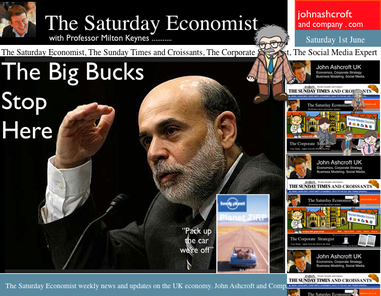 This week Bernanke signaled the end of QE, just as Obama signaled the end of the Bernanke regime at the Fed. “Well, I think Ben’s done an outstanding job... he’s already stayed a lot longer than he wanted or he was supposed to”, said the president this week. Ouch. Some of us feel the same way about the great QE experiment. It may soon, all be over. On the basis the unemployment rate falls to a target rate of 6.5% in the US, the $85 billion monthly asset purchase programme will drift to a close within the next twelve months. As Truman may have said, The Big Bucks stop here! Bernanke explains this is not a tightening of policy. The Fed is lifting its foot off the gas, (reducing QE) not hitting the brakes (increasing base rates). Fascinating. Monetarists believe controlling the economy is like driving a chevy. Foot on the gas, toe on the brakes, steering the economy in the right direction. Total control. Keynesians on the other hand, believe the economy is like some great Keynesian slot machine, insert the coins, adjust the Okun ratio, pull the lever - jobs flow as the money tumbles into the bottom of the gaming well. If only it was all so easy! The markets were a little confused. US Treasury yields jumped higher to 2.54% up by over 40 basis points, as the Dow closed down 200 points on the week. So what happened back home? In the UK, Sir Mervyn King’s time at the Bank of England draws to a close. At the Mansion House this week, The Chancellor announced a peerage for the Governor, marking the passage of Lord King to the upper house and the passage of QE as a policy option in the UK. In other news, inflation CPI basis ticked back to 2.7% from the 2.4% relief in April. Manufacturing prices show little evidence of pressure as input prices remain subdued and the uptick in output prices to 2.2% in the month should be easily contained. Inflation CPI should end the year around the 2.4%, no threat to policy at that level. Retail sales in May were up by 1.9% in volume terms, marking a modest recovery but no great surge forward. The borrowing figures were released for May. Public sector net borrowing excluding temporary effects of financial interventions was £8.8 billion. This is £6.9 billion lower than in May 2012 when it was £15.6 billion. At first sight this is great news from the Chancellor but ... Closer inspection reveals borrowing has been reduced by £3.9 billion from transfers from the Bank of England Asset Purchase Facility Fund and by £3.2 billion from retrospective tax payments by Swiss banks. The Old Lady has been mugged again by the Treasury and time is up for the Swiss deposit accounts flattering the performance in the month. Nevertheless, the borrowing figures will improve this year as the economy continues to recover and spending plans bite. Check out the IFS release for details. What happened to sterling? Sterling fell on dollar strength to 1.5425 from 1.5703 and held at 1.1757 (1.1763) against the Euro. The Euro dollar closed at 1.3115 from 1.3345 and against the Yen, the dollar closed up at 97.8 from 94.06. Oil Price Brent Crude closed at $101 from $105.93. Markets, The Dow closed down 14,799 from 15,070. The FTSE closed at 6,116 from 6,308. Time to stand aside whilst markets consolidate. It will soon be time to average in. UK Ten year gilt yields closed at 2.42 from 2.08, US gilt yields closed up at 2.54 from 2.13. The great rotation is gathering momentum. Gold closed down at $1293 from $1,390. Worshippers of the old relic do not know what to make of it all, as we begin the exodus from Planet ZIRP. That’s all for this week, don’t miss The Sunday Times and Croissants out tomorrow. Join the mailing list for The Saturday Economist or forward to a friend UK Economics news and analysis : no politics, no dogma, no polemics, just facts. JKA The material is based upon information which we consider to be reliable but we do not represent that it is accurate or complete and it should not be relied upon as such. We accept no liability for errors, or omissions of opinion or fact. In particular, no reliance should be placed on the comments on trends in financial markets. The receipt of this email should not be construed as the giving of investment advice.
0 Comments
Leave a Reply. |
The Saturday EconomistAuthorJohn Ashcroft publishes the Saturday Economist. Join the mailing list for updates on the UK and World Economy. Archives
July 2024
Categories
All
|
| The Saturday Economist |
The material is based upon information which we consider to be reliable but we do not represent that it is accurate or complete and it should not be relied upon as such. We accept no liability for errors, or omissions of opinion or fact. In particular, no reliance should be placed on the comments on trends in financial markets. The presentation should not be construed as the giving of investment advice.
|
The Saturday Economist, weekly updates on the UK economy.
Sign Up Now! Stay Up To Date! | Privacy Policy | Terms and Conditions | |
 RSS Feed
RSS Feed